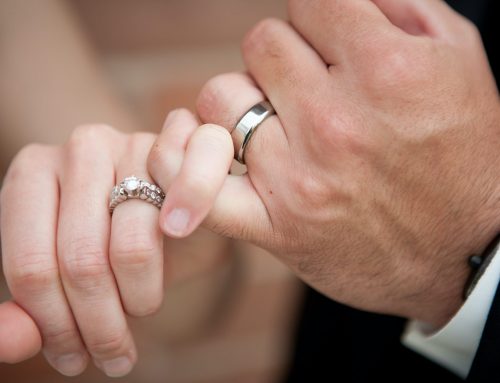Dating is often equal parts challenging and exhilarating, but things get more complicated when you’re seeing someone who has a mental health condition. If you’re active in the dating scene, this situation could be more likely than you think, as about 8% of adults experience depression and almost 20% have an anxiety disorder.
Moreover, these conditions can come and go at different times in a person’s life, meaning that your current partner could very well experience them at some point in the future even if they aren’t dealing with them right now. Conversely, your partner may currently be diagnosed with depression or anxiety, but that doesn’t mean they’ll be struggling forever.

Depression and anxiety are difficult — and, at times, debilitating — conditions. While everyone encounters obstacles throughout the course of their romances, they can put a heavy strain on your relationship. These mental illnesses may affect how your partner thinks, feels, and behaves. It can be incredibly painful to watch them struggle and hard to know how to help them cope.
If your partner is going through a tough time, it’s important to know how you can best support them. Whether you’ve just started a new relationship or you’re getting ready to pop the question, here are a few things you should try to keep in mind while dating someone diagnosed with depression or anxiety:
1. Learn About Their Condition
First and foremost, take some time to learn about your partner’s mental health condition, the way you would a physical disease or chronic health issue. Both depression and anxiety are legitimate health disorders, but it can be difficult to understand how they affect your partner if you’re unfamiliar with how they work. Doing some research about these disorders, their symptoms, and their effects can make them less abstract and scary, as well as much easier to deal with in your relationship.
As you do research, be sure to talk with your partner about their personal experiences. Try not to assume that something will be true for them just because you read about it or because it is a common occurrence with others. Remember that your partner is the most knowledgeable resource when it comes to their own mental health.
2. Be Aware of the Challenges
Additionally, you need to be aware of the relationship challenges posed by both depression and anxiety. For example, if your partner is diagnosed with depression, they could have a tendency to self-isolate or push their loved ones away; on the other hand, if they have an anxiety diagnosis, they might be hypersensitive to criticism, rejection, or other perceived slights. Of course, these types of behaviors can vary greatly from person to person, and your partner may react in their own distinct way.
As you get to know your partner and learn more about their mental health, you’ll also learn how to respond to and overcome these challenges. Above all else, you should try not to take it personally when your partner behaves strangely due to their mental illness.
If your partner is diagnosed with depression or anxiety, their mental condition isn’t an excuse for mistreating you. However, it is important to remember that what they’re dealing with has nothing to do with you or your relationship.
3. Discover What Your Partner Needs
Try to determine what your partner needs from you when they’re going through a depressive or anxious episode. It could be that they need a shoulder to cry on or some time alone, but they may also need a fun distraction or some encouragement to get their mind off of things.
Depending on how long you’ve known them, you may already have a good idea of the best way to help, but if you’ve recently started dating, this process will take time and patience on your part. If you’re considering a long term future and marriage, it’s important you are familiar with their needs regarding their mental health, and you need to have more than a cursory understanding of their diagnosis.
If you are familiar with how your partner receives love, that can be a good starting point in trying to figure out what they need from you when they’re going through a rough patch. Even if you think you know what to do, it’s always best to ask them how you can help out, as what they need may change.
4. Improve Your Communication
All relationships need effective communication from both parties, but being with a partner who is diagnosed with depression or anxiety almost requires you to develop a new language. It’s crucial for both of you to become more active listeners, rather than waiting for your turn to talk, so you can focus on simultaneously validating the other’s feelings while making sure your own are being heard.
Active listening can also help promote closeness between you and your partner — something that can feel much needed if your partner’s mental health is suffering.
Keep in mind that this is a two-way street. You need open communication, emotional validation, and active listening from your partner, too, even when they’re feeling depressed or anxious. Not only is it a necessity for developing or maintaining a strong relationship, but you are equally deserving of that same level of support from them.
5. Support Their Healing
When dating someone who is diagnosed with any type of mental illness, it’s important to be supportive of their healing process. Help them engage in healthy, helpful, and productive behaviors when you can, and encourage them in their efforts to improve their mental health or seek treatment. Essentially, make sure your partner knows that they can count on you while they navigate their mental health struggles.
However, supporting their healing does not mean that you can “cure” or “fix” your partner’s anxiety or depression. Not only is it not possible, but you are not responsible for their mental health.
As their significant other, it’s your job to offer love and support, not to be their therapist or doctor. It’s unfair to put that pressure on yourself, and researchers believe that doing so can have negative effects on your own mental health. Though it can be hard, try to accept your role in your partner’s life and focus on doing what you can, rather than what you can’t.
6. Take Care of Your Own Mental Health
Similarly, you have to make your own mental health a priority. It can be easy to forget about your own needs if you’re concentrating on helping your partner, but it’s just as important to take care of yourself. Letting your mental health fall by the wayside will only end up hurting you in the long run, as you won’t have the mental or emotional capacity to deal with life’s stressors.
You know what you need to recharge and relax better than anyone else. Continue to maintain your relationships with other people, take care of your body with a balanced diet and regular exercise, and enjoy your usual hobbies and activities. Don’t feel guilty or selfish for doing so. Your partner will understand and likely be just encouraging and supportive of your efforts as you are of them.
7. Plan for the Future Carefully
You should also be careful about planning for the future with your partner. It’s important to remember that the two of you could be dealing with their depression or anxiety for your entire time together.
This doesn’t mean you should end your relationship because your partner has been diagnosed with a mental health condition; rather, just that you should think about how that could impact your future as a couple, especially when it comes to major topics like moving in together, getting married, and having children.
If you’re serious about planning a long-term future together, you should talk about these things as openly as possible, even if it’s uncomfortable. If you and your partner are already serious, make sure you can continue to communicate as you get closer and take new steps in your relationship.
When the time is right to pick out the perfect ring and ask the big question, you should both be ready and excited about your future. And if you’ve found the right person, it probably doesn’t matter what health issues either of you have, as long as you’re willing to face them together.
8. Be Empathetic and Compassionate
Do your best to remain empathetic and compassionate toward your partner, especially when they’re going through a difficult time. They can’t control how their disorder affects them, their emotions, or their mood, and they’re likely suffering more than you know. While a romantic relationship or partner can’t cure mental illness, your kind and understanding attitude can be a big source of comfort on difficult days.
Finally, always focus on the positive aspects of your relationship and remember the love you have for your partner. Though they have mental health struggles, this is only one part of their life and does not make up their entire identity or your entire relationship.
You and your partner have far more to offer each other. And even though their depression or anxiety diagnosis can be difficult to deal with, it can ultimately help you understand each other better and foster a deeper, more meaningful connection.





Leave A Comment